|
|
|
Sort Order |
|
|
|
Items / Page
|
|
|
|
|
|
|
| Srl | Item |
| 1 |
ID:
156467
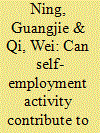

|
|
|
|
|
| Summary/Abstract |
The ascension to urban citizenship and assimilation into urban life for rural to urban migrant workers is a pressing mission during the current process of rapid urbanization in developing China. However, the issue of how self-employed migrants, who account for up to 25 percent of total migrant workers in 2009 (Meng, 2012), acquire urban citizenship remains understudied. Using a unique sample from the 2009 Rural to Urban Migrants in China (RUMiC) survey, this paper explores whether self-employment choice contributes to migrant workers' ascension to urban citizenship and integration, and uncovers the underlying mechanisms. We find that although self-employed migrants are capable of earning a higher income, and improving their living conditions, their tendency to reside permanently in the city is not significantly different from their counterparts of wage workers. We argue that self-employed migrants, who are less covered by urban social securities and are more discriminated against by current urban household registration (Hukou) system, tend to lose faith in ascension to urban citizenship. It implies that a social security system with self-employed migrants being covered as well as an urban Hukou admission system favoring diverse human capital (especially taking into account entrepreneurship) would help accelerate the urbanization process.
|
|
|
|
|
|
|
|
|
|
|
|
|
|
|
|
| 2 |
ID:
105073
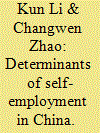

|
|
|
|
|
| Publication |
2011.
|
| Summary/Abstract |
This paper presents and tests a series of sources of regional variations in self-employment rate in China in the 2000s, and illustrates that the stage of economic development is a major explanation for the variations of self-employment rate across regions over the past decade. The negative relationship between the stage of economic development and self-employment rate identified in the paper indicates that China has entered the process of fast industrialization, and self-employment is playing a diminishing role in economic growth and employment. We also find a substitution effect between self-employment and private enterprises. While both are important components of China's private sector, private enterprises are becoming an increasingly important source of China's economic growth and employment. Furthermore, our findings also imply that when job opportunities are limited, self-employment in China is likely a forced choice of disadvantaged people who are not qualified for wage jobs.
|
|
|
|
|
|
|
|
|
|
|
|
|
|
|
|
| 3 |
ID:
105074
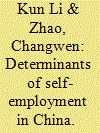

|
|
|
|
|
| Publication |
2011.
|
| Summary/Abstract |
This paper presents and tests a series of sources of regional variations in self-employment rate in China in the 2000s, and illustrates that the stage of economic development is a major explanation for the variations of self-employment rate across regions over the past decade. The negative relationship between the stage of economic development and self-employment rate identified in the paper indicates that China has entered the process of fast industrialization, and self-employment is playing a diminishing role in economic growth and employment. We also find a substitution effect between self-employment and private enterprises. While both are important components of China's private sector, private enterprises are becoming an increasingly important source of China's economic growth and employment. Furthermore, our findings also imply that when job opportunities are limited, self-employment in China is likely a forced choice of disadvantaged people who are not qualified for wage jobs.
|
|
|
|
|
|
|
|
|
|
|
|
|
|
|
|
| 4 |
ID:
133724


|
|
|
|
|
| Publication |
2014.
|
| Summary/Abstract |
The intention of this paper is two-fold; firstly, it is to explore the causal effect of perceived negativity towards Further Education and Training (FET) college education among South African youth. Secondly, it is to determine the impact of apprenticeship on the development of entrepreneurial knowledge and skills among FET college students. The FET sector serves a particular function, which is the imparting of hands-on vocational training, intended to inculcate and promote a culture of self-employment, considered a necessity for employment creation. A questionnaire was used to collect data from 112 randomly selected students from three Motheo FET colleges. The findings reveal very contrasting results, a direct correlation between apprenticeship and entrepreneurship; however, 53% of the respondents did not feel sufficiently equipped, ready and confident enough to start their own businesses after graduation. About 48% feel the need to further their studies at university in order to stand a better chance of landing a good job.
|
|
|
|
|
|
|
|
|
|
|
|
|
|
|
|
| 5 |
ID:
145580
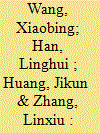

|
|
|
|
|
| Summary/Abstract |
The goal of the present paper is to examine how the expansion of the economy from 2000 has affected rural off-farm labor market participation. Specifically, we seek to determine whether off-farm labor increased after 2000, what forms of employment are driving trends in off-farm labor and whether gender differences can be observed in off-farm employment trends. Using a nationally representative dataset that consist of two waves of surveys conducted in 2000 and 2008 in six provinces, this paper finds that off-farm labor market participation continued to rise steadily in the early 2000s. However, there is a clear difference in the trends associated with occupational choice before and after 2000. In addition, we find that rural off-farm employment trends are different for men and women. Our analysis also shows that the rise of wage-earning employment corresponds with an increasing unskilled wage for both men and women.
|
|
|
|
|
|
|
|
|
|
|
|
|
|
|
|
| 6 |
ID:
090790


|
|
|
|
|
| Publication |
2009.
|
| Summary/Abstract |
This paper analyses whether Grameen Bank's claim of increasing entitlements has any impact on women's capabilities with regard to entering into the marketplace. Achieving capabilities toward entering into the market, deeply related to the issue of gendered power relations, is a significant sign of self-empowerment in rural Bangladesh. The paper also examines wheter micro-loans have been able to improve rural women's well being, critical for empowering women in society where there rights to physical well-being have long been ignored. It further argues that these capabilities are the most important factor for empowering women, and are necessary steps towards establishing gender justice in rural Bangladesh
|
|
|
|
|
|
|
|
|
|
|
|
|
|
|
|
| 7 |
ID:
171003
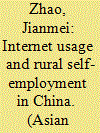

|
|
|
|
|
| Summary/Abstract |
With the rapid development of information technology, the internet has penetrated rural China. In this article I examine the impact of internet usage on rural self-employment and investigate its major channels. Employing a semiparametric bivariate probit model, the research finds that internet usage significantly increases the probability of rural self-employment by 5 to 7 percentage points. Further evidence points to the significant impact of internet usage on male, older, and better educated rural laborers, whereas such an effect on female, younger, and less educated laborers is not remarkable. Channel investigation reveals that internet usage encourages rural self-employment by weakening financial constraints, lessening social capital restrictions, and reducing transaction costs.
|
|
|
|
|
|
|
|
|
|
|
|
|
|
|
|
| 8 |
ID:
124548
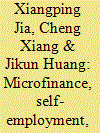

|
|
|
|
|
| Publication |
2013.
|
| Summary/Abstract |
China is experiencing a transformation, as vast numbers of rural laborers move toward off-farm employment. In such a transformation, the role of credit is unclear. The overall goal of this study is to examine the impact of access to credit by rural households on employment decision-making by rural laborers in China. Based on longitudinal data concerning 1992 rural households in China, this study finds that the use of credit is immense in rural China. Among different types of credit, access to microfinance significantly increased farmers' time working on self-employment activities, especially for the poor households. Credit from formal financial institutions and informal networks had no such effect.
|
|
|
|
|
|
|
|
|
|
|
|
|
|
|
|
| 9 |
ID:
141659


|
|
|
|
|
| Summary/Abstract |
Following President Obama’s announcement of a rapprochement with the Cuban regime, US government officials have offered three basic avenues to the economic reforms they say will ultimately result in greater personal freedom for the island’s citizens: fostering the small-enterprise sector in Cuba, encouraging US investments, and boosting US tourism to the island. These efforts to produce prosperity, together with the reestablishment of diplomatic relations, they believe, will advance US security and democratic governance in Cuba. Critics of the initiative, however, believe that this new policy is, as Samuel Johnson said of second marriages, a triumph of hope over experience, and that in the long run it will harm US national interests almost as much as it disappoints the Cuban people.
|
|
|
|
|
|
|
|
|
|
|
|
|
|
|
|
| 10 |
ID:
148266


|
|
|
|
|
| Summary/Abstract |
This article discusses the phenomenon of self-employment in Cuba from three perspectives: its conceptualisation, its links with informality and the challenges to its growth. First, it reviews the characteristics of self-employment in Cuba, in comparison with available theory and with various studies of informality carried out in other countries. Second, it documents the dimensions of informality and Cuba’s black market economy through the study of a specific sector of the independent labour force: shoe producers. Third, it considers the main challenges for the growth of self-employment in Cuba, as illustrated by the case of Cuban shoemakers, and draws some lessons that should improve the situation of this sector, taking into account different international studies.
|
|
|
|
|
|
|
|
|
|
|
|
|
|
|
|
| 11 |
ID:
185087
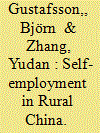

|
|
|
|
|
| Summary/Abstract |
Changes in the employment structure in rural China were studied with a focus on off-farm self-employment. Data from the Chinese Household Income Project surveys were used, covering the same 14 provinces from 1988 to 2018. We found that the proportion of adults in rural China with self-employment as their primary form of off-farm employment increased from only 2 percent in 1988 to 11 percent in 2013, with no further increases through 2018. In 1988 and 1995, the rate of self-employment was highest in the eastern region but this regional pattern subsequently disappeared. The probability of being self-employed in rural China was higher among married males than among unmarried persons. Having a migration experience increased the likelihood of being self-employed. Since 1995, self-employed households have had a higher average income than other categories of household. Based on estimates of income functions, we conclude that the income premium from being self-employed increased rapidly from 1988 to 1995 to become remarkably large when only a few adults were self-employed. However, as a larger fraction of the rural population entered self-employment, the payoff from being self-employed has rapidly diminished, although it was still substantial in 2018.
|
|
|
|
|
|
|
|
|
|
|
|
|
|
|
|
| 12 |
ID:
185088
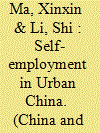

|
|
|
|
|
| Summary/Abstract |
To explore the mechanism of entry to the self-employed sector in urban China, this study tested two hypotheses: the entrepreneurship hypothesis and the disguised unemployment hypothesis, investigating the impact of mass entrepreneurship and innovation policies on business start-ups. Three main findings emerged. First, the entrepreneurship hypothesis was rejected for both local urban residents and migrants in 2013 but was supported for both groups in 2018. Second, the causality relationship between mass entrepreneurship and innovation policies and business starts-ups was not significant. Third, the results differed by group. The entrepreneurship hypothesis was supported for the younger generation of migrants in 2018 but was clearly rejected for the less educated, both in the local urban resident and migrant groups in 2013 and 2018. Robustness checks confirmed these conclusions.
|
|
|
|
|
|
|
|
|
|
|
|
|
|
|
|
|
|
|
|
|